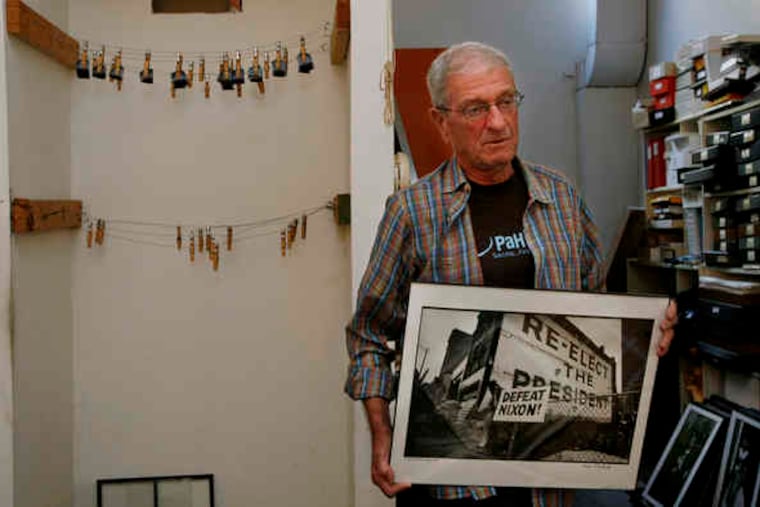A chronicler of social activism
Harvey Finkle's photographs, some say, "capture what most of us cannot even see."

Perhaps, by sheer volume or the absence of merit, blogs that allow anyone to publish and cell phones that make photographers of us all ultimately will dull our reactions to the strife that surrounds us.
But if that happens, don't blame Harvey Finkle.
A documentary photographer whose black-and-white stills are extensively exhibited and published, Finkle records the struggles of individuals in need and the activists who rally on their behalf.
At demonstrations where the cause was accessibility for the disabled, justice for the criminally accused, protection for workers, or respect for cultural difference, Finkle, now 75, has stood vigil for more than 30 years on Philadelphia's streets, training his lens on emotions that exceed words. Few have achieved more with a Leica Rangefinder.
On Thursday evening, Finkle will be honored at the National Constitution Center by the Bread & Roses Community Fund, which raises money for social action causes. He cofounded the group in 1978, and will be recognized for his relentless efforts in the cause of social justice.
His photographs will be displayed, and colleagues will praise his talent and determination in a video tribute.
They'll speak of how often he worked for free when agencies lacked the funds to pay him; how far he marched in Mississippi with the Kensington Welfare Rights Union, how long he stood in the rain outside a prison or a nuclear reactor to get the right picture. They'll recount his work in Cuba, Guatemala, Israel, Gaza, Brazil and India.
When it's his turn, Finkle is sure to deflect the praise. He'll thank the other Bread & Roses founders and joke that tributes like this are frighteningly funereal.
And he will likely conclude that the folks doing the demonstrating - not the photographer recording their actions - were the real agents of change.
But Stephen F. Gold, who met Finkle in 1963 playing pickup basketball on Pine Street, insists that Finkle's compelling pictures, not his own words, overturned a case in the Third Circuit Court of appeals thereby guaranteeing disabled people access to public transportation nationally.
"Some people write books and tell stories," Gold says. "Harvey tells us what's important through his pictures. And the rest of us are just incredibly lucky and blessed that Harvey Finkle became a photographer."
Finkle is, perhaps, the ultimate quiet man. Not shy or softspoken, but selfless - as if, like Tom Joad, he came to see that there is but one collective soul, one pain and a shared responsibility.
The oldest child of New Deal Democrats whose values were shaped by the universality with which Americans experienced both economic depression and collective recovery, Finkle says he found nothing in his parents' home against which to rebel.
He attended Central High and majored in business at Temple University for lack of another compelling interest. Later, after stumbling into social work, he earned a graduate degree in that field at the University of Pennsylvania.
As a caseworker assigned to indigent elderly people living at Broad and Lehigh, Finkle says, "You saw a lot that you never saw in Oxford Circle."
Photography did not appear on Finkle's radar until 1962, when he saw a show at the Museum of Modern Art in New York of Harry Callahan's landmark art photography. He didn't buy a camera for another five years.
"And I don't think I got a good picture for the first two to three years after that," he says.
By 1968, he was a first-time father coming to terms with the reality that his son was deaf (as would be his daughter). He remembers being stunned.
He and his wife, Carol, became advocates for their children, fighting for the right classrooms and teachers. He worked fewer hours then, and, perhaps as a diversion, experimented with taking and developing pictures.
But he also could not ignore the political and racial turmoil raging across the country. With other social workers, Finkle urged the United Way to fund grass- roots groups working for social change, not just those providing social services. And when that failed, he and others formed the People's Fund, which later became Bread & Roses.
Carol Finkle went on to start Creative Access, a program that brings the arts to people with disabilities. Harvey Finkle traveled with and photographed the National Theater of the Deaf and followed the Deaf Olympics to New Zealand. Though the couple divorced in 1984, they remain friends.
Twenty years ago, when Project HOME was in its infancy, Finkle asked Sister Mary Scullion's permission to photograph the first group of women under her care. One of the women commented that Finkle seemed to have a third eye.
"I remember that because I thought it was such a great way to describe Harvey's work," Scullion says. "He can capture what most of us cannot even see."
Far from retiring, Finkle is at work documenting the evolving transgender community. He speaks of feeling blessed and grateful that he's survived while doing work he loves.
"This is what I do and I've never aspired to more," he says. "Never been interested in making films or anything like that."
"I appreciate the honor," Finkle says of the forthcoming tribute. "But I'll have to make a speech and that's not in my comfort zone."
The many Philadelphia news photographers who know Finkle and are accustomed to seeing him at every demonstration they cover know, too, his familiar farewell.
"See you on the street," he says.
Tribute to Change
Bread & Roses honors documentary photographer Harvey Finkle at 6 p.m. Thursday at the National Constitution Center, Sixth and Arch Streets.
Tickets: $50 per person includes drinks and light fare.
Information: 215-731-1107 or www.breadrosesfund.org.EndText